«
looking for larry 2, alexandria
»
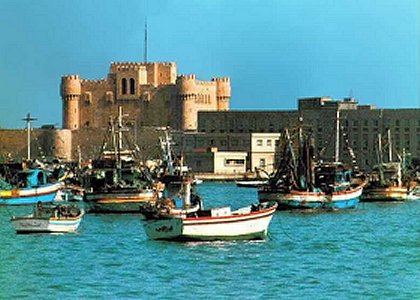
june 10-11, 1999
alexandria
so now i'm on the 11:30 a.m. express to “alex”. alex--andria. pride of the
conquering alexander the great in 333 b.c.. home of cleopatra. marc antony.
julius caesar. seat of learning of the entire ancient world. western outpost in
the islamic diaspora. home of muslims, christians, copts, jews. the sensual,
worldly, convoluted, mysterious -- al-iskandariya.
but none of these are what brings me here. no, i'm here for one thing - for one
man - only. lawrence durrell. and his great literary masterpiece, “the
alexandria quartet”. i've read it at least three times, in various passings, the
most recent being on last summer's pilgrimage to the greek island of corfu,
where durrell lived and wrote for years, as well as entertained his literary
mentor and my main man, henry miller. four books – “justine”, “balthazar”,
“mountolive”, and “clea” - names of four of the books' protagonists - in sum,
all contributing to the most intricate, ornate, richly satisfying literary
analysis of love, passion, jealousy, politics, duplicity, and life that i've had
the pleasure and challenge of reading. along with the enjoyment of his opulent
and luxurious prose, what durrell offers in these books is a single story told
from four points of view. after reading the first book, “justine”, the reader
assumes what the author has told him is true. after all, that's what novelists
do - reveal the truth - from their wise, literary, third person omniscience.
isn't that what we learned in school? but no, durrell fractures the idea
completely, having his next book reveal a completely opposing and contradictory
view of the same events - justine's betrayal and sudden disappearance - from a
second character's point of view. and then he does it again in the third book,
then again in the fourth. finally, the reader is left with at least four
versions of "the truth", trying to assemble and come to grips with the swirling,
shattered mosaic durrell has so beautifully constructed. immense. delicious.
sphinx-like. supremely and exhaustingly - satisfying.

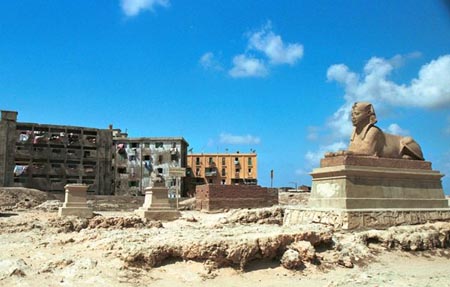

that's why i've come here to alexandria. to see what remains of durrell's
exotic, colonial, multi-faceted city of the 1930s and 40s. i already know i will
be disappointed. i've heard from toute la monde that the glorious days of the
city are long behind her. the great diplomatic embassies, the plush colonial
hotels along the mediterranean's elegant corniche, the exquisite homes, the
sophisticated and privileged denizens -- all are supposedly gone - long given
way to the urban disrepair, the crowded grime and congestion of modern day
islamic and independent egypt. but i have come anyway. i have to feast my eyes
on durrell's alexandria, or what's left of it, searching for his alleyways of
collusion, his bazaars of murderous revenge, his ballrooms of masked intrigue
and duplicitous, unsparing love.
anthony, my clever american friend from jerusalem, has given me the name of a
native alexandrian, someone he met on his trip to alex. i haven't been able to
reach “nezim” by phone since my arrival in cairo, but this morning, at the train
station, about ten minutes before my scheduled departure, i do. alright! another
sweet synchronicity of travel.

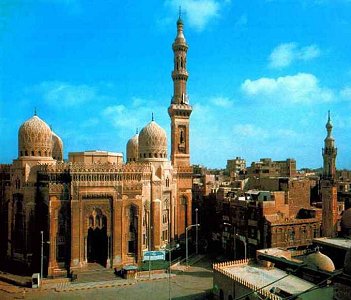

the train is a quick, efficient but scenic hour from cairo to alex. heading
north into the rich, wet, black-soiled nile delta, it feels like the countryside
has been untouched by centuries. dark-skinned, white-clad neighbors are still
tilling the soil, working their animals, and hanging their laundry on
outstretched multi-colored clotheslines. between the two modern, chaotic urban
centers lies the entire history of ancient and contemporary egypt – the nile,
pharaohs, pyramids, alexander, cleopatra, seljuks, fatamids, sultans, pashas,
kings, colonialists… and eternity. me, i'm just the silent, accidental tourist,
wide-eyed and open-hearted, soaking it all up.
nezim is a thirty-eight year old, small-boned, sad-eyed egyptian in conflict
with his own culture. the son of a wealthy international banker and his
gold-digging, now-divorced ex-wife, he is a man of privilege and unknown
direction. he lives with his dog, doby, in the old italian colonial center of
alex, one of the very sections of the city that durrell's comfortable diplomats
settled and developed. unfortunately, city planners have since built a busy
train station about half a block from his grandmother's former villa, and the
house rattles like a tin trap every half an hour - twenty four hours a day.
nezim, being the loyal and responsible eldest son, has been stuck holding the
bag. he waters the yard, answers the mail, and waits for the property to be
sold. nervous from the constant train traffic, jaded by his western education in
well-known universities in boston and montana, and resigned to the backwardness
and incivility of his hungry, bottom-feeding neighbors and fellow countrymen, it
looks like he has had, and perhaps will continue to have, a long wait.

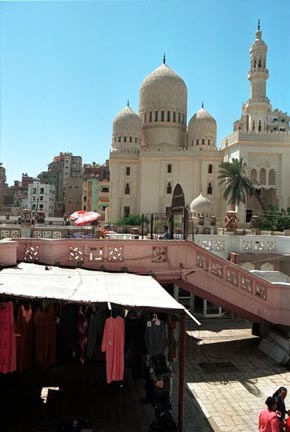

he is, however, extremely generous. he invites me to stay with him as long as i
want. and he insists on paying for absolutely everything. he and his "butler",
mohammed, take me everywhere they can think of - by taxi. we visit the famous
lighthouse at the rocky point where cleopatra eagerly awaited her roman
paramour, marc antony. we see the greco-roman museum, the white marble roman
amphitheater, pompey's pillar, another ornate and exquisite mosque at abu
al-abbas. tiring himself, nezim sends me to the eastern beaches of king farouk's
former summer retreat, montaza palace. one can feel the incredible decadence,
vanity, and power of the last ruling egyptian monarch. it is said that farouk
narrowly escaped his death by helicoptering away from the encroaching forces of
liberation as they chased him into the crashing mediterranean.
the next morning, i take myself for a long and aimless walk, trying to soak up
the life and breath of justine's formerly nefarious city. i don't have to wander
very far before i find myself within the confines of an old coptic cemetery. it
houses acres and acres of white and pink family tombs, high-crossed religious
crypts and mausoleums, and rows and rows of outdoor, brightly covered funerary
parlors. the grounds look like, at one time, they were sedulously planted and
manicured, but now the tangled gardens are overgrown and forgotten, the clay
flowerpots cracked and scattered in shards, and the day watchman comfortably
collapsed into a deep slumber. hence, my absolute freedom to walk around and
photograph this striking combination of past and present. the cemetery workers
are friendly and warm, seemingly typical of day-laboring egyptians, and they
smile and pose for my pictures.

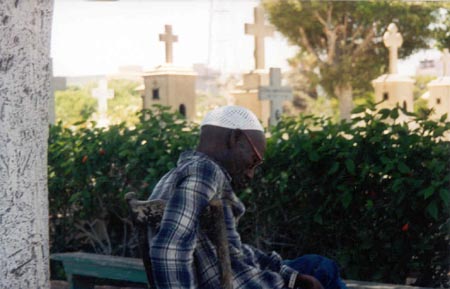

i am once again speculating on the meaning of "coptic". i have read in books
that it is described as a non-catholic form of christianity, indigenous to the
cities of northern egypt. when the first ecumenical council of 325 AD divided
christianity among five centers - constantinople, jerusalem, rome, antioch, and
alexandria, coptic worship was supposedly already in place here in alexandria.
justine's husband, nessim, a powerful but emotionally reserved banker, and his
wild, horse-taming brother, narouz, were both copts. somehow linking pharonic
and hellenic egypt, then draped and enveloped in the cloak of islam, the copts
insist on the monophysitic nature of christ, have their own rituals and symbols,
their unique architecture and funerary practices, yet still - remain a complete
mystery to most outside their belief. like justine herself. like alexandria
herself. while i feel like more like darley, durrell's astute but naive narrator
in “the quartet”. the eternal outsider. forever baffled by his elusive and
enigmatic lover. justine - the worldly jewess, sexual object of desire of the
rich and powerful in coptic and islamic alexandria. a woman frighteningly at
odds with her own history. a woman desperately and tragically unknown even to
herself . justine - inscrutable, insoluble, unpossessable - ultimately no one's
at all. like the city's greatest icon, the clandestine cleopatra - a woman, a
city, a culture - veiling itself under layers and millennia of secrecy,
religion, conflict, and accommodation.

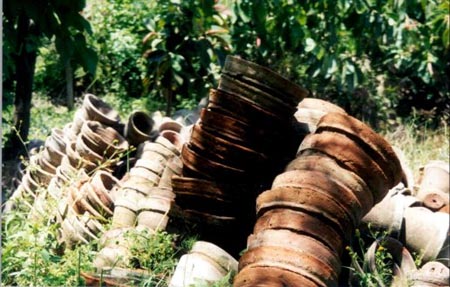

in the afternoon, back with my host and his faithful servant, we are again
benefactors of the great sea. however, where once ruled the mighty british navy,
where perhaps at another juncture in history once oared wayward phoenicians on
their journeys to and from ancient carthage, where once mighty pharaohs ruled
the old and new kingdoms of the upper and lower nile for three thousand years,
now sits a raggedly fleet of dilapidated blue and white wooden fishing boats,
with dark-skinned smiling boys throwing themselves carelessly into the
garbage-reeking port.
once again, it is my hosts, nezim and mohammed, who are in my complete service,
asking me how they can, in any way, further edify and pleasure my visit to their
once-great city. nezim decides we will take one of these run-down fishing boats
on a cruise to nowhere, having bright-eyed mohammed arrange all the finer
details with a local fishing crew. within an hour, we are scooped up from the
pier and puttered safely out into the protected bay, finding ourselves eating
deliciously pan-fried fish caught no more than half an hour before. it’s
sensual. immediate. totally alexandrian. for the rest of the afternoon, we don’t
really “sail” anywhere so much as we just sit, talk, and drink beer with our
local crew, in the stagnant bay, as the relentless equatorial sun slowly makes
its way towards the horizon. i get the sad but distinct feeling that there is
simply nowhere to go. at least not for nezim and mohammed on this typically
cloudless and aimless day in alexandria in very post colonial egypt, just one
year before the dawn of the twenty first century.

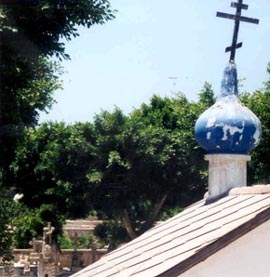

but as i enjoy the beauty and serenity of the fine afternoon created solely for
my delight, i can not help but marvel at the way the fisherman casually throw
their paper plates, plastic forks, beer bottles, and fish bones into the
helpless sea. i look back to the shore and see a few more reckless boys throw
themselves happily into this ocean of garbage. and the combination of the two
activities, the throwing of, and the swimming in, this sea of garbage, strikes
me as such a fitting and sad metaphor for the distance the great city has fallen
- and for the dilapidation it has undergone since the sophistication and finery
of durrell. not that he wrote only about the lives of upper class businessmen,
diplomats, and society woman. he didn’t. his prose was full of the smell of the
marketplace and barbershop, the stench of the shouk and bazaar, the sweat of
horses and humans, the semen and blood of sex and revenge. but now his once
great city, that of cleopatra, antony, and caesar, seemed more than anything,
lazy and impotent. almost unaware of her own stagnation and disrepair. a
run-down historical relic, although far from extinct, also far from her glory
and beauty.



all this i knew before i came. just as on the island of corfu, i could barely
find a citizen who recognized the name, “lawrence durrell”, nor find his once
muscular writing studio and home that had now been turned into the touristic
“white house” restaurant and pensione, here too, in alexandria, lawrence durrell
and his exotic, sensual city, were now nothing but two more antiquated and near
meaningless names in the city’s rich and unsparing past. except, of course, for
literary pilgrims such as myself, this hungrily-wandering and eternally romantic
new york poet/con.
oh, my kind and generous friend, nezim; oh, my sad and fallen literary treasure,
alexandria, i wish you a clement and gentle -- adieu.
oh yes, and goodbye and a bientot, my literary hero, larry durrell.

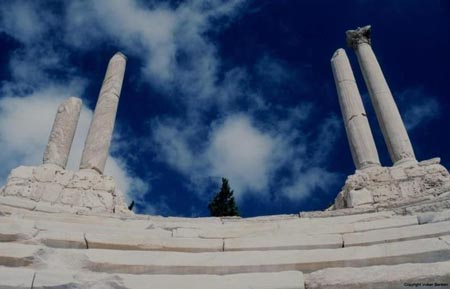


|
|
|